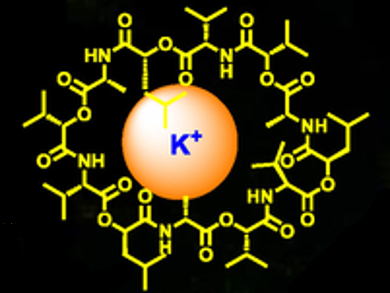Cereulide is a toxic metabolite produced by specific strains of Bacillus cereus, which cause diarrhea and vomiting (emetic syndrome). Foodstuffs can be contaminated with cereulide which is produced during the growth of bacteria within the food. Cereulide intoxication can be prevented if the toxin is detected in the food prior to consumption.
Tomás Torroba, University of Burgos, Spain, Mónica Farraga, Universidad de Cantabria, Santander, Spain, and colleagues have designed fluorescent probes for potassium cation, which could be used for displacement assays with cereulide. Cereulide can complex potassium ions (pictured). The displacement of a potassium cations from a specific preformed complex results in a change in fluorescence emission. This allows the successful detection of natural cereulide in samples of cooked rice, using synthetic cereulide as a reference compound together with a fluorescent potassium reporter.
Owing to the toxicity of cereulide, it is important to be able to detect its presence by screening food prior to consumption, as the toxin is able to survive cooking temperatures. These probes enable a rapid, portable, in situ method for identifying food that is contaminated with cereulide toxin, thereby offering a way to prevent food-borne outbreaks of emetic syndrome.
- Potassium-Ion-Selective Fluorescent Sensors To Detect Cereulide, the Emetic Toxin of B. cereus, in Food Samples and HeLa Cells,
José García-Calvo, Saturnino Ibeas, Eva-Clara Antón-García, Tomás Torroba, Gerardo González-Aguilar, Wilson Antunes, Eloísa González-Lavado, Mónica L. Fanarraga,
ChemistryOpen 2017.
DOI: 10.1002/open.201700057


